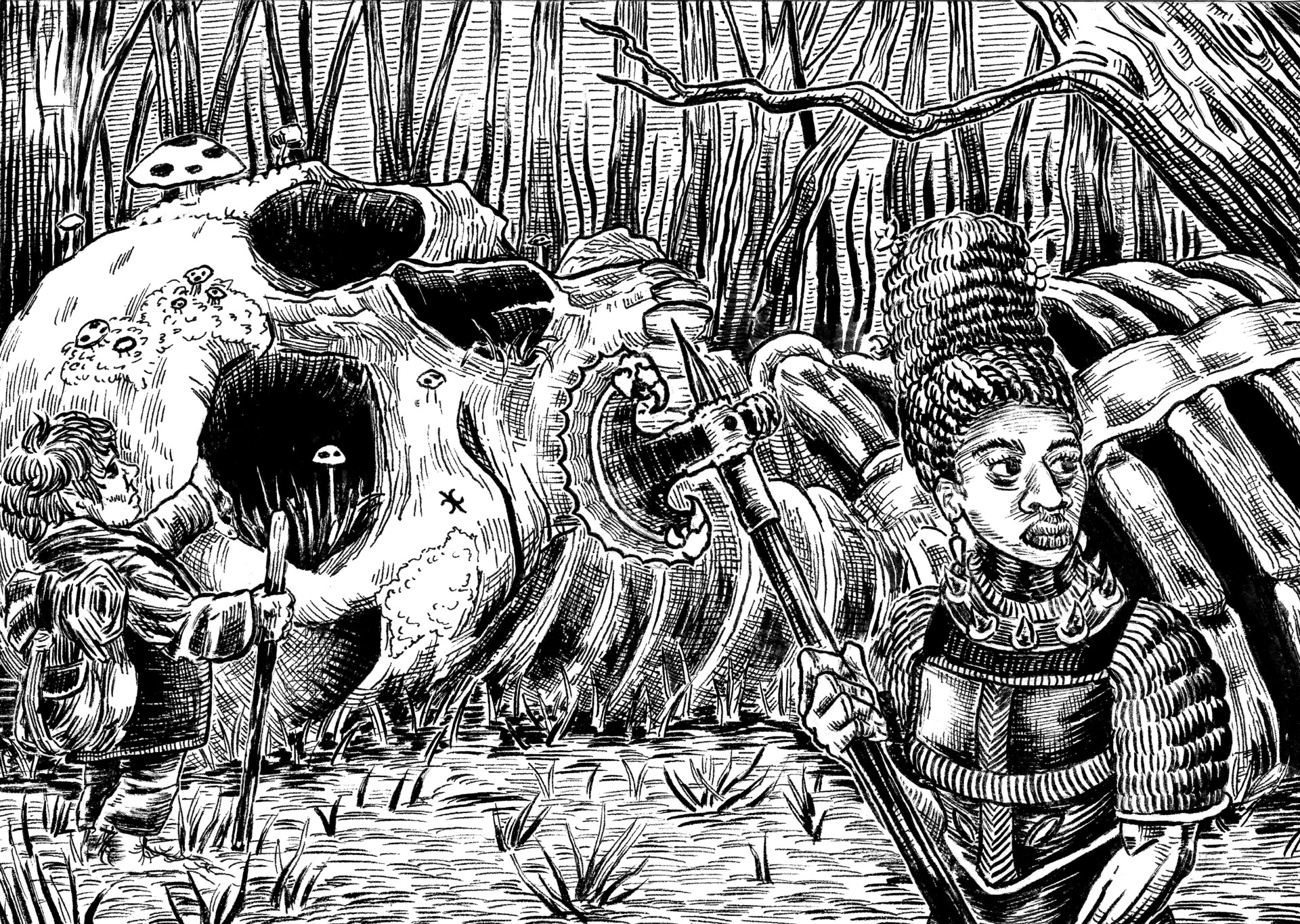A few days ago, user Ryan on the Necrotic Gnome Discord server asked if anyone used a simpler version of 3d6 Down the Line's "Feats of Exploration" XP rules, something without its extra calculation steps. I shared my campaign's rules for gaining experience through exploration, and the subsequent conversation led me to ponder the role of character advancement rules in adventure and campaign design.
Your rules for character advancement should reflect what's important
in your campaign, and should reinforce the campaign's tone and hammer
home its general vibe. Experience points for treasure sets this
precedent. It incentivizes players to do anything for gold, and thus
they become the very scoundrels and antiheroes of Sword & Sorcery
that early TTRPG innovators sought to emulate.
XP for GP turns PCs
into Fafhrd and the Grey Mouser. XP for slaying monsters turns them
into Geralt of Rivia. XP for stepping out their front door and going on
an adventure turns them into Bilbo Baggins. You get the idea.
Let's be real, though: XP for GP is the best of these. But why?
When PCs delve into the dungeon, they push deeper and deeper to
accumulate more and more loot. Most importantly, the players strive to
accumulate as much loot as they can in a single trip. Because, every time they leave and return, they must ...
- Ascend back to the entrance of the dungeon safely
- Travel from the dungeon back to town safely
- Resupply for another trip
- Travel back to the dungeon from town safely
- Deal with new threats that have moved into the dungeon
All
just to get back to where you made it last time. Who wants to do that?
These serve as cons against leaving the dungeon for both the player and
the character. The character has to spend more money to resupply and
risks more random encounters. The player has to spend more play time
retracing their steps and dealing with logistics.
Don't
get me wrong: spending play time on logistics can be fun. My current
campaign revolves around exploring an uncharted continent; trust me, we
love logistics. But, it's not something you want to keep doing over and
over in a short period of time. You want each expedition into the
dungeon to be worth it.
All of this comes together to give the adventure a sense of velocity;
momentum pushing the players in one direction. Keep delving, get as
much treasure as we can possibly carry. Hire retainers and buy mules
just to carry more treasure per trip. Open another door and risk another
encounter.
Along with this momentum comes increasing risk,
which in turn gives the game an intoxicating sense of tension. As you
delve deeper, characters use up more resources. They carry more
treasure: heavy bags of coins and bulky golden statues that slow them down. And, they
attract more attention with their light and noise.
Rules that primarily grant experience for slaying monsters don't typically
provide the same combination of velocity and risk that creates this
delicious tension. If your goal is to slay monsters, then running into
monsters isn't exactly a con. This leaves resupplying as the only valid
con from the list above, and when a system trivializes resource
management with powerful spells or simply hand-waves it altogether ...
well, then the tension evaporates completely.
So,
when you grant character advancement via means other than treasure,
your game benefits if you can recreate that same velocity-risk cocktail.
In my campaign, with its emphasis on wilderness exploration and
discovery, I did this by granting an exponentially increasing amount of
XP for every fully explored area (or, a 6-mile hex). Exploring that
first area grants only 200 XP. By the fourth area, the character can
earn 1,000 XP just for pushing on into the fifth.
 |
| Earn XP for Exploring the Wilderness! |
This
drives the players toward longer expeditions that go further from home.
It encourages them to spend just one more night in the wilderness only
to stumble into a new faction's territory the next day. During my
campaign, this has yielded multiple exciting races to get home, where
players have gone without food and rest in a mad dash to get to safety
before they starve to death or get caught by monsters.
By
customizing the game's source of character advancement while maintaining
the same tension inherent in using XP for GP, the players themselves
have chosen to go on exactly the sort of adventures that I have yearned
to portray. And, they've done it for diegetic reasons that maintain a
sense of coherency within the fiction.



> "Your rules for character advancement should reflect what's important in your campaign, and should reinforce the campaign's tone and hammer home its general vibe."
ReplyDeleteI do agree, and am sort of curious when people disagree. It feels rather self evident and satisfying to me. But each to their own, I suppose!
I like the way XP increases the longer you spend in the wilderness. There was a retroclone that did something similar with dungeon rooms explored--you only got credit for new ones, not retreading old ground. I cannot remember it for the life of me now, though!
Some new referees may not even realize that they can "safely" change the XP rules, or that changing them will impact the game quite so much. It's easy to underestimate the impact of switching from modern XP systems to XP for GP until you experience it yourself.
DeleteHowever, I could imagine someone making the argument that XP rules are first and foremost about game balance. They ensure that your character progresses at "just the right rate" for the challenges that the game system deems appropriate for that character's level and that tweaking them at all violates the written rules.
Thanks for the comment!